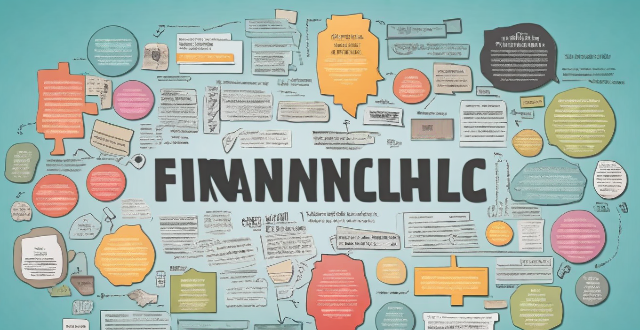Application Financial

What are the common mistakes to avoid when applying for scholarships ?
When applying for scholarships, it's important to avoid common mistakes that could harm your chances of receiving financial aid. Key points include ensuring accuracy and completeness of your application, submitting on time, writing clear and tailored essays, meeting eligibility criteria, customizing each application, seeking recommendations early, showing financial need, not overlooking smaller awards, following up appropriately, and maintaining integrity without plagiarism or dishonesty. By avoiding these pitfalls, you can present yourself as a diligent and deserving candidate for scholarship opportunities.

How does a co-signer affect my mortgage application ?
A co-signer is a person who signs a loan application along with the primary borrower. The co-signer agrees to take on the responsibility of repaying the loan if the primary borrower fails to do so. In this article, we will discuss how a co-signer affects your mortgage application. The credit score of both the primary borrower and the co-signer plays a significant role in determining the eligibility for a mortgage loan. A co-signer with a good credit score can improve the chances of getting approved for a mortgage loan. However, if the co-signer has a poor credit score, it may negatively impact the loan approval process. The income and debt-to-income ratio (DTI) of both the primary borrower and the co-signer are also important factors that lenders consider when evaluating a mortgage application. If the co-signer has a high income and low DTI, it can help strengthen the application and increase the chances of approval. On the other hand, if the co-signer has a low income or high DTI, it may negatively impact the loan approval process. Lenders also consider the employment history of both the primary borrower and the co-signer when evaluating a mortgage application. A stable employment history can demonstrate financial stability and reliability, which can positively impact the loan approval process. If the co-signer has a stable employment history, it can help strengthen the application and increase the chances of approval. The assets and liabilities of both the primary borrower and the co-signer are also taken into consideration by lenders when evaluating a mortgage application. If the co-signer has significant assets and few liabilities, it can help strengthen the application and increase the chances of approval. However, if the co-signer has significant liabilities or limited assets, it may negatively impact the loan approval process. In conclusion, a co-signer can have a significant impact on your mortgage application. Their credit score, income and DTI, employment history, assets, and liabilities are all factors that lenders consider when evaluating a mortgage application. It is important to choose a co-signer who has a good credit score, stable employment history, and low DTI to increase the chances of getting approved for a mortgage loan.

Is it necessary to have a return ticket for a tourist visa application ?
The text discusses the importance of a return ticket for a tourist visa application. It states that a return ticket is necessary to ensure the traveler has plans to return to their home country after the completion of their trip. Other documents required for a tourist visa application include a valid passport, hotel reservation, travel itinerary, financial evidence, invitation letter, travel insurance, application form, and photo. The return ticket is considered important as it shows the embassy or consulate that the traveler plans to return to their home country after their trip, reduces the chances of overstaying their visa period, assures the authorities of departure arrangements, and maintains the integrity of visa policies. If a traveler cannot provide a return ticket at the time of application, there is a high probability of visa rejection. However, an onward journey ticket can be provided as an alternative. Alternatives to a return ticket include one-way tickets, open-ended tickets, refundable tickets, and onward journey tickets. To ensure the availability of a return ticket, travelers should book in advance, choose flexible dates, opt for refundable tickets, and check with airlines about their policies. Not providing a return ticket can lead to visa rejection, blacklisting, impact future applications, and financial losses. Travel agents can assist in getting a return ticket or suggesting alternatives but may charge additional fees.

What kinds of questions should I expect during the insurance application process ?
When applying for insurance, you will be asked a variety of questions to assess your risk level and determine the appropriate coverage and premiums. These questions cover personal information, employment details, health history, lifestyle habits, driving record, insurance history, financial information, beneficiaries and dependents, and additional questions related to hobbies, travel plans, and pets. Honesty is crucial when answering these questions as providing false information can result in denied claims or policy cancellation. It's essential to review your application carefully before submitting it to ensure all information is accurate and complete.

What documents do I need to provide for a tourist visa application ?
The text provides a list of essential documents required for a tourist visa application, including a passport with at least six months' validity and two blank visa pages, recent passport photographs meeting specific requirements, a completed visa application form, a detailed travel itinerary, proof of financial means, an invitation letter if applicable, travel insurance, and a cover letter explaining the purpose of the visit. The text emphasizes the importance of gathering these documents beforehand to make the application process smoother and increase the chances of success. It also notes that specific requirements may vary by country, so applicants should check the documentation needs and specifications for each item.

How do I choose the right drive motor for my application ?
When selecting a drive motor for your application, considerWhen selecting a drive motor for your application, considerrque and speed, power duty cycle, cost, size, control compatibility, safety compliance, maintenance, and manufacturer reputation. This comprehensive guide helps ensure you choose a motor that meets your needs effectively and efficiently.

How can I check the status of my tourist visa application ?
Checking the status of your tourist visa application can be a nerve-wracking experience, especially when you're eagerly anticipating your travel plans. Here's a step-by-step guide to help you through the process: 1. Determine the type of visa you applied for, as different visas might have different checking procedures. 2. Locate the appropriate government website or portal dedicated to visa services where you can check the status of your application. 3. Have your application details ready, such as Application ID Number, Passport Number, and Date of Birth. 4. Enter the required details into the online system on the visa status portal. 5. Submit the form and retrieve the status of your visa application. 6. Interpret the status message, which could indicate that your application has been accepted, is under review, requires administrative processing, has been issued, or has been refused. 7. Follow up if necessary with the embassy or consulate for any delays or further action required. Additional tips include keeping track of timelines, being patient as visa processing times can vary, and staying informed about any events that might affect processing times. By following these steps, you should be able to effectively check the status of your tourist visa application and plan accordingly.

How can I choose the right combination motor drive for my application ?
When selecting a combination motor drive for your application, consider factors such as the type of motor (AC, DC, stepper, or servo), application requirements (load characteristics, speed and torque needs, control precision), appropriate drive technology (VFDs, electronic speed controls, stepper motor drives, servo amplifiers), compatibility and integration with existing systems, performance features (efficiency, dynamic response, protection features), budget and cost considerations (initial and operating costs), and seek professional advice from manufacturers and technical support.

What are some common mistakes to avoid when rushing through makeup application ?
When rushing through makeup application, common mistakes includeWhen rushing through makeup application, common mistakes include the wrong tools, not blend not blending properly, choosing the wrong shade or formula, ignoring eyebrows, and applying too much product. Taking your time and following these tips can help avoid these mistakes and ensure a flawless finish every time.

What are the key factors to consider when selecting a permanent magnet motor for a specific application ?
When selecting a permanent magnet motor for a specific application, several key factors must be considered to ensure optimal performance and efficiency. These factors include application requirements, efficiency and performance, size and weight, temperature range and cooling, control and feedback systems, cost and budget, reliability and durability, and compatibility with other system components. By carefully considering these key factors when selecting a permanent magnet motor for your specific application, you can ensure that you choose a motor that meets your needs in terms of performance, efficiency, size, cooling requirements, control options, cost, reliability, and compatibility with other system components.

What are the key factors to consider when designing an energy storage system for a specific application ?
When designing an energy storage system (ESS) for a specific application, key factors to consider include capacity (power and energy requirements, discharge rate), efficiency (round-trip efficiency, self-discharge rate), reliability (cycle life, safety), cost (capital expenses, operating expenses), environmental impact (sustainability, emissions), and scalability (modular design, flexibility). These considerations will ensure the ESS meets application needs while operating efficiently, reliably, and sustainably.

How do I apply for a student loan ?
This text provides a comprehensive guide on how to apply for a student loan. It outlines nine steps, including determining needs, researching loan options, checking eligibility requirements, gathering documents, completing and submitting the application form, waiting for approval, signing promissory notes and loan agreements, and receiving disbursement of loan funds. The guide emphasizes the importance of understanding different loan options and their terms and conditions before applying. It also highlights the need to gather all necessary documents and provide accurate information in the application form. Overall, this text is an essential resource for students seeking financial assistance for their education.

How does Fintech impact financial inclusion ?
Fintech has revolutionized financial services, making them more accessible and affordable. It has increased accessibility for unbanked populations, lowered costs, improved efficiency, driven innovation, enhanced security, promoted financial literacy, facilitated inclusion initiatives, enabled digital identity verification, supported microfinance and crowdfunding, and promoted mobile money and payment systems. These advancements have significantly impacted financial inclusion worldwide.

How can I maintain my financial freedom once I achieve it ?
The text discusses strategies for maintaining financial freedom, including creating a budget and sticking to it, building an emergency fund, investing wisely, living below one's means, and continuously learning and growing. It emphasizes the importance of discipline, planning, and effort in sustaining financial independence.

What is the impact of financial regulation on innovation in the financial sector ?
Financial regulation plays a critical role in the innovation landscape of the financial sector, with both positive and negative impacts. Positively, it promotes transparency and trust, encourages responsible innovation, and facilitates access to capital. However, it can also slow down the pace of innovation, restrict experimentation, and stifle international competitiveness. To mitigate these negative effects, adaptive regulation, collaborative approaches, and education and training are recommended. Striking a balance between fostering innovation and ensuring safety is crucial.

What is the relationship between financial regulation and financial stability ?
The relationship between financial regulation and financial stability is crucial for the proper functioning of the economy. Financial regulation, consisting of laws and guidelines, aims to ensure the safety and soundness of the financial system and protect consumers. Financial stability, on the other hand, refers to a condition where the financial system can withstand shocks without significant disruptions. Financial regulation affects financial stability in several ways: 1. It prevents financial fraud and misconduct by enforcing strict rules and penalties, maintaining public trust in the financial sector. 2. It promotes transparency and disclosure, allowing stakeholders to make informed decisions and enabling regulators to monitor the financial system effectively. 3. Regulators encourage sound risk management practices, such as capital requirements and stress testing, contributing to overall financial stability. 4. They maintain market integrity by promoting fair competition and preventing monopolistic behavior, ensuring confidence in the financial system. 5. Regulators address systemic risks through macroprudential policies, safeguarding against widespread financial instability. In conclusion, financial regulation plays a vital role in maintaining financial stability by preventing fraud, promoting transparency, encouraging sound risk management, maintaining market integrity, and addressing systemic risks. However, finding the right balance between regulation and innovation is crucial for achieving both regulatory effectiveness and financial stability.

What is the impact of financial regulation on global financial markets ?
Financial regulation is vital for maintaining stability and efficiency in global financial markets. It influences market stability by reducing volatility and preventing crises, improves risk management through enhanced transparency and control over high-risk practices, protects investors from fraud and unfair trading practices, and fosters innovation while ensuring safety and compliance. This balance is crucial for the health and growth of the global economy.

How do financial regulations impact banks and other financial institutions ?
Financial regulations are crucial for maintaining stability in the banking and financial sector. They protect depositors' interests, promote fair competition, prevent financial crises, and impact innovation and efficiency. Regulations like capital adequacy ratios, liquidity coverage ratios, and stress testing ensure depositors' safety. Antitrust laws and consumer protection laws encourage fair competition among banks. Prudential supervision and Basel III help prevent financial crises. However, excessive regulation may negatively affect innovation and profitability. Striking a balance between safety and promoting innovation is key.

How can governments encourage and improve financial literacy among citizens ?
Governments can encourage financial literacy by implementing education programs, offering accessible financial services, and enforcing consumer protection regulations. This will help citizens make informed decisions about their money, investments, and debts.

What role does financial literacy play in achieving wealth growth ?
Financial literacy is essential for wealth growth, encompassing budgeting, saving, investing, retirement planning, and credit management. By understanding these aspects, individuals can make informed financial decisions, reduce debt, build wealth, and achieve long-term financial stability.

In what ways does financial literacy affect personal finance management ?
Financial literacy is crucial for managing personal finances effectively, as it helps individuals understand basic financial concepts, promotes prudent budgeting and spending habits, shapes savvy saving and investing strategies, and facilitates efficient debt management.

What is financial regulation ?
The text discusses the concept of financial regulation, which is a set of rules and guidelines that govern the operations of financial institutions. The primary objectives are to ensure stability and integrity of the financial system, promote fair dealing, protect consumers, and prevent financial crises. Key components include prudential regulation, market conduct regulation, consumer protection, systemic risk oversight, structural regulation, regulation of market infrastructure, and international coordination. Purposes of financial regulation are to ensure stability, promote transparency, protect consumers, facilitate efficiency, and prevent criminal activity. Methods of financial regulation include rulemaking, supervision, inspection, capital requirements, and liquidity requirements. Challenges in financial regulation include balancing oversight with innovation, keeping pace with technology, and international coordination.

Can anyone achieve financial freedom ?
Financial freedom, a state where one's passive and active income covers living expenses without regular time-for-money exchanges, is a goal many strive for. Key factors for achieving it include education, saving habits, smart investing, debt management, multiple income streams, avoiding lifestyle inflation, long-term planning, and the right mindset. Actionable steps include budgeting, automated savings, early investing, continuous learning, and networking with like-minded individuals. While not everyone may achieve financial freedom due to varying circumstances, it is attainable for those who are committed and strategic in their approach.

Is there a financial case for divesting from high-carbon industries ?
The debate over whether there is a financial case for divesting from high-carbon industries is ongoing, with proponents arguing that it can improve risk management, long-term returns, and alignment with sustainability goals, while opponents contend that it can lead to lost opportunities, lack of evidence for financial benefits, and short-term costs. The decision to divest ultimately depends on individual investor preferences and goals.

How has financial regulation evolved over time ?
The evolution of financial regulation has been marked by significant changes in response to economic crises, technological advancements, and shifts in political ideologies. From the laissez-faire approach of early days to the rise of regulatory frameworks during the Great Depression, through the deregulation era of the late 20th century, and the renewed emphasis on regulation following the Global Financial Crisis, financial regulation has adapted to maintain stability and promote growth within the financial sector. The digital age presents new challenges, requiring regulators to adapt existing frameworks to accommodate technological innovations while ensuring consumer protection and systemic stability.

Why is financial regulation important ?
Financial regulation plays a crucial role in maintaining the stability and integrity of the financial system. It protects investors by ensuring transparency and preventing fraudulent activities, maintains stability by preventing excessive risk-taking, encourages economic growth through competition and innovation, and prevents financial crime such as money laundering. Without adequate regulation, the risks associated with financial activities could lead to significant economic disruptions and harm to individuals and businesses alike.

What are the main objectives of financial regulation ?
The main objectives of financial regulation are to promote stability, efficiency, and protect consumer interests in the financial sector. This involves preventing systemic risks, protecting depositors and investors, ensuring market integrity, encouraging competition, improving access to finance, facilitating innovation, ensuring fair treatment, providing education, and handling complaints. By achieving these goals, financial regulators help maintain a healthy and vibrant economy while safeguarding the interests of all stakeholders involved.

How can I achieve financial freedom ?
Financial freedom is a state where an individual has enough savings, investments, and cash flow to live comfortably without depending on a regular job. It requires careful planning, discipline, and patience. This guide provides strategies for achieving financial freedom, including setting clear goals, creating a budget, building an emergency fund, paying off high-interest debt, investing wisely, increasing income, and living below your means. By following these strategies, you can take control of your finances and work towards achieving financial freedom over time.

How can employers promote financial knowledge among their employees ?
Employers can promote financial knowledge among employees by offering financial education programs, encouraging retirement planning, providing access to financial counseling services, offering financial wellness programs, creating a culture of financial literacy, providing financial incentives for participating in financial education programs, and offering tax planning services.

What are some common misconceptions about personal finance that financial education aims to correct ?
The text discusses common misconceptions about personal finance, such as the belief that saving is more important than investing and that credit cards are inherently bad. It also touches on the perceived tedium of budgeting, the underestimation of life insurance's importance, and the notion that retirement savings are unattainable for some. Moreover, it dispels the myth that all investments carry high risk and emphasizes the necessity of having a will. Overall, the article highlights how financial education can correct these misguided beliefs and help individuals manage their money wisely to achieve their financial objectives.